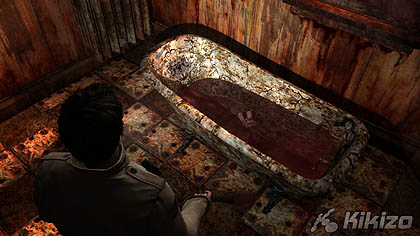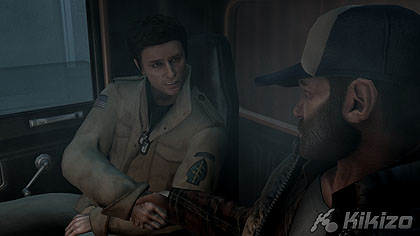Silent Hill Homecoming: Konami Interview
Can Silent Hill still make a noise on current-gen platforms? We discuss with the game's producer.
Page: 1 2
Page 2
Double Helix claims to have resolved this issue by hiking the monster AI a tad and stirring in more complex controls and time-sensitive moves. "What we did was we added two different attack buttons - fast and weak, strong and slow - and a dodge button," Hullett tells us. "And you can combine all three in different ways, so it opens up different techniques, different combos. If I dodge and attack, I might dodge forward and perform an upward strike and open him up for more attacks. So that makes the character more versatile, it lets you do more in battle - it's more fulfilling.
"But then of course if the monsters stayed the same it would be cake, so we made the monsters a lot more aggressive. If you have any weakness they'll exploit them, so you can still run away from combat if you want - if you want to ignore it - but if you want to delve into it the monsters aren't just going to be pushovers, they're going to fight back and they take a lot to go down, and they'll kill you if you let them."
The dodge system is quite lenient, perhaps to offset such hardy opposition, rewarding timely responses while allowing the cack-handed to get through intact. "If you hit [the button] right you actually get out the way, and you can keep attacking, [but] if you miss it a little bit, you still dodge but you block with your weapon... so it's not going to penalise you for missing your timing."
Moving on from the demon-bludgeoning, we asked Hullett whether there was any foundation to rumours that the Silent Hill movie, ambivalently received by critics, had been a source of inspiration. Fortunately the parallels in Homecoming seem to be chiefly to do with graphical impact and marketing. "I think what the movie did really well was to get that visual style down," he enthuses, "the first half of the movie I was really excited - "hey, this is Silent Hill!" - and then it kind of shifts into its own thing. Some people like it and other people don't."
"There are some visual cues from the movie that we take, such as the transition to the dark world," he says. "You know - everything kind of peels away like paint, and then you're left with that hellish state."
Double Helix has operated without much supervision from original Silent Hill developer Team Silent, currently beavering away on tantalisingly hush-hush projects in their native Japan. Akira Yamaoka, supreme grandmaster of unnerving ambient noise, has contributed a fresh soundtrack and leant a certain amount of hands-off support: "He made sure it felt like Silent Hill, that it 'fit.'" This approach, says Hullett, is indicative of a broader momentum within Konami, as the company begins to entrust its signature franchises to western studios. "We're starting to develop a lot more of the original properties - a UK studio did New International Track and Field. So Konami's trying to be one big company rather than just Japan does this, and the US does this."
All of which is apparently good for the regeneration of Silent Hill. "You have to make it interesting and keep it alive, so that's been a challenge, and switching to the western developer and having new people come in with new ideas kind of helps that too because it's thinking about what Silent Hill is in different ways. So it's something different to everyone and if you involve new people, you see new angles on the universe."
And will we be seeing more Silent Hill games situated beyond Silent Hill, taking the franchise beyond its narrative roots much as Konami is transporting it beyond its native soil? Maybe. "Right now I can't say that's a direction that we're necessarily moving in," Hullett concludes. "But I just think it's important that that's a possibility. Something you can't do with horror is make it mundane and predictable, and I think with all these games taking place in the same town and the same things happening... the audience will start getting smaller and smaller because the people who just want to be scared will know what's going on, and then you just end up with the people who want the story.
"And so in an attempt to appeal to everyone, we're going to be continuing to develop the overall universe of Silent Hill, and saying, y'know, it's not just this town - this could happen anywhere."
Silent Hill: Homecoming is out this week for Xbox 360, PC and PlayStation 3 in North America. The European version hits shelves on October 30.
Page: 1 2







 Satoru Iwata Video Interview - the late Nintendo president spoke with Kikizo in 2004 as 'Nintendo Revolution' loomed.
Satoru Iwata Video Interview - the late Nintendo president spoke with Kikizo in 2004 as 'Nintendo Revolution' loomed. Kaz Hirai Video Interview - the first of Kikizo's interviews with the man who went on to become global head of Sony.
Kaz Hirai Video Interview - the first of Kikizo's interviews with the man who went on to become global head of Sony. Ed Fries Video Interview - one of Xbox's founders discusses an epic journey from Excel to Xbox.
Ed Fries Video Interview - one of Xbox's founders discusses an epic journey from Excel to Xbox. Yu Suzuki, the Kikizo Interview - we spend time with one of gaming's most revered creators.
Yu Suzuki, the Kikizo Interview - we spend time with one of gaming's most revered creators. Tetris - The Making of an Icon: Alexey Pajitnov and Henk Rogers reveal the fascinating story behind Tetris
Tetris - The Making of an Icon: Alexey Pajitnov and Henk Rogers reveal the fascinating story behind Tetris Rare founders, Chris and Tim Stamper - their only interview? Genuinely 'rare' sit down with founders of the legendary studio.
Rare founders, Chris and Tim Stamper - their only interview? Genuinely 'rare' sit down with founders of the legendary studio. The History of First-Person Shooters - a retrospective, from Maze War to Modern Warfare
The History of First-Person Shooters - a retrospective, from Maze War to Modern Warfare